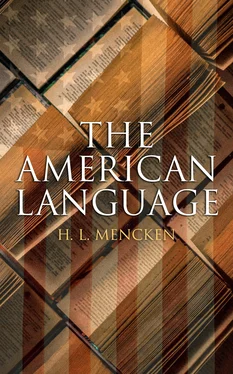2.Vol. i, p. vi.
3.Scheme for a New Alphabet and a Reformed Mode of Spelling; Philadelphia, 1768.
4.Dec. 26, 1789. The Works of B. Franklin, ed. by A. F. Smyth; New York, 1905, vol. i, p. 40.
5.The Druid, No. 5; reprinted in Witherspoon's Collected Works, edited by Ashbel Green, vol. iv; New York, 1800-1.
6. Vide , in addition to the citations in the text, the British Critic, Nov. 1793; Feb. 1810; the Critical Review, July 1807; Sept. 1809; the Monthly Review, May 1808; the Eclectic Review, Aug. 1813.
7.1815, pp. 307-14; reprinted in his Remarks on National Literature, Boston, 1823.
8.American English, North American Review, April, 1883.
9.A number of such Indian words are preserved in the nomenclature of Tammany Hall and in that of the Improved Order of Red Men, an organization with more than 500,000 members. The Red Men, borrowing from the Indians, thus name the months, in order: Cold Moon , Snow , Worm , Plant , Flower , Hot , Buck , Sturgeon , Corn , Travelers' , Beaver and Hunting . They call their officers incohonee , sachem , wampum-keeper , etc. But such terms, of course, are not in general use.
10.A long list of such obsolete Americanisms is given by Clapin in his Dictionary.
11.An Account of the History, Manners and Customs of the Indian Nations....; Phila., 1818.
12. Cf. Hans Brinker, by Mary Maples Dodge; New York, 1891.
13.( a ) A chest of drawers, ( b ) a government office. In both senses the word is rare in English, though its use by the French is familiar. In the United States its use in ( b ) has been extended, e. g. , in employment-bureau .
14.From Sint-Klaas — Saint Nicholas . Santa Claus has also become familiar to the English, but the Oxford Dictionary still calls the name an Americanism.
15.The spelling is variously sauerkraut , saurkraut , sourkraut and sourkrout .
16. Cf. The Cambridge History of American Literature, vol. i, pp. 14 and 22.
17.The American origin of this last word has been disputed, but the weight of evidence seems to show that it was borrowed from the rapides of the French Canadians. It is familiar in the United States and Canada, but seldom met with in England.
18. Log-cabin came in later. Thornton's first quotation is dated 1818. The Log-Cabin campaign was in 1840.
19.Theo. Roosevelt: Gouverneur Morris; Boston, 1888, p. 104.
20.William Brown Meloney: The Heritage of Tyre; New York, 1916, p. 15.
21. Vide his preface to Every-Day English, pp. xxi and xv, respectively.
22. Vide Lyell's Travels in North America; London, 1845.
23.Pref. to the Biglow Papers, 2nd series, 1866.
24.Reprinted in Helpful Hints in Writing and Reading, comp. by Grenville Kleiser; New York, 1911, pp. 15-17.
25.A. Cleveland Coxe: Americanisms in England, Forum, Oct., 1886.
26.Edwin S. Gould: Good English, or, Popular Errors in Language: New York, 1867; pp. 25-27.
27. Cf. Ch. I, § 5, and Ch. V, § 1.
28. Lott appears in the Connecticut Code of 1650. Vide the edition of Andrus; Hartford, 1822. On page 35 is "their landes, lotts and accommodations." On page 46 is "meadow and home lotts ."
29. Vide Hutchinson's Diary, vol. i, p. 171; London, 1883-6.
30.The definitions are from the Concise Oxford Dictionary of Current English (1914) and the Standard Dictionary (1906), respectively.
31.S. Sewall: Diary, April 14, 1712: "I lay'd a Rock in the North-east corner of the Foundation of the Meeting-house."
32.The Americana, ... art. Americanisms: New York, 1903-6.
33.Immigration, 2nd ed.; New York, 1913, p. 4. Sir J. R. Seeley says, in The Expansion of England (2nd ed.; London, 1895, p. 84) that the emigration from England to New England, after the meeting of the Long Parliament (1640), was so slight for a full century that it barely balanced "the counter-movement of colonists quitting the colony." Richard Hildreth, in his History of the United States, vol. i, p. 267, says that the departures actually exceeded the arrivals.
34.Works, ed. by Sparks: vol. ii, p. 319.
35. Cf. Pehr Kalm: Travels into N. America, tr. by J. R. Forster, 3 vols.; London, 1770-71.
36.Sydney George Fisher: The True Story of the American Revolution; Phila. and London, 1902, p. 27. See also John T. Morse's Life of Thomas Jefferson in the American Statesmen series (Boston and New York, 1898), p. 2. Morse points out that Washington, Jefferson and Madison belonged to this new aristocracy, not to the old one.
37. Cf. the Cambridge History of American Literature, vol. i, p. 119. Francis Jeffrey, writing on Franklin in the Edinburgh Review for July, 1806, hailed him as a prodigy who had arisen "in a society where there was no relish and no encouragement for literature."
38.Examples of its use in the American sense, considered vulgar and even indecent in England, are to be found in Gen. xlviii, 1; II Kings viii, 7; John xi, 1, and Acts ix, 37.
39.J. O. Halliwell (Phillips): A Dictionary of Archaisms and Provincialisms, Containing Words now Obsolete in England All of Which are Familiar and in Common Use in America, 2nd ed.; London, 1850.
40.An interesting discussion of this verb appeared in the New York Sun, Nov. 27, 1914.
41. Cf. J. H. Combs: Old, Early and Elizabethan English in the Southern Mountains, Dialect Notes, vol. iv, pt. iv, pp. 283-97.
42.Henry Sweet: A History of English Sounds; London, 1876; Oxford, 1888.
43.P. 124.
44. Cf. Art. Changes in the Language Since Shakespeare's Time, by W. Murison, in The Cambridge History of English Literature, vol. xiv, p. 485.
45.English Spelling and Spelling Reform; New York, 1909.
46.C. H. Grandgent: Fashion and the Broad A , Nation, Jan. 7, 1915.
47.Thomas Sheridan: A Complete Dictionary of the English Language; London, 1780.
48.It first appeared in Robert Nares' Elements of Orthography; London, 1784. In 1791 it received full approbation in John Walker's Critical Pronouncing Dictionary.
49.Robert J. Menner; The Pronunciation of English in America, Atlantic Monthly, March, 1915.
50.The Question of Our Speech; Boston and New York, 1906, pp. 27-29.
51.Elizabeth H. Hancock: Southern Speech, Neale's Monthly, Nov., 1913, pp. 606-7.
52. Vide his remarks on balance in his Vocabulary. See also Marsh, p. 671.
III. THE PERIOD OF GROWTH
Table of Contents
Table of Contents
—The American language thus began to be recognizably differentiated from English in both vocabulary and pronunciation by the opening of the nineteenth century, but as yet its growth was hampered by two factors, the first being the lack of a national literature of any pretentions and the second being an internal political disharmony which greatly conditioned and enfeebled the national consciousness. During the actual Revolution common aims and common dangers forced the Americans to show a united front, but once they had achieved political independence they developed conflicting interests, and out of those conflicting interests came suspicions and hatreds which came near wrecking the new confederation more than once. Politically, their worst weakness, perhaps, was an inability to detach themselves wholly from the struggle for domination still going on in Europe. The surviving Loyalists of the revolutionary era—estimated by some authorities to have constituted fully a third of the total population in 1776—were ardently in favor of England, and such patriots as Jefferson were as ardently in favor of France. This engrossment in the quarrels of foreign nations was what Washington warned against in his Farewell Address. It was at the bottom of such bitter animosities as that between Jefferson and Hamilton. It inspired and perhaps excused the pessimism of such men as Burr. Its net effect was to make it difficult for the people of the new nation to think of themselves, politically, as Americans. Their state of mind, vacillating, uncertain, alternately timorous and pugnacious, has been well described by Henry Cabot Lodge in his essay on "Colonialism in America." 1Soon after the Treaty of Paris was signed, someone referred to the late struggle, in Franklin's hearing, as the War for Independence. "Say, rather, the War of the Revolution," said Franklin. "The War for Independence is yet to be fought."
Читать дальше












